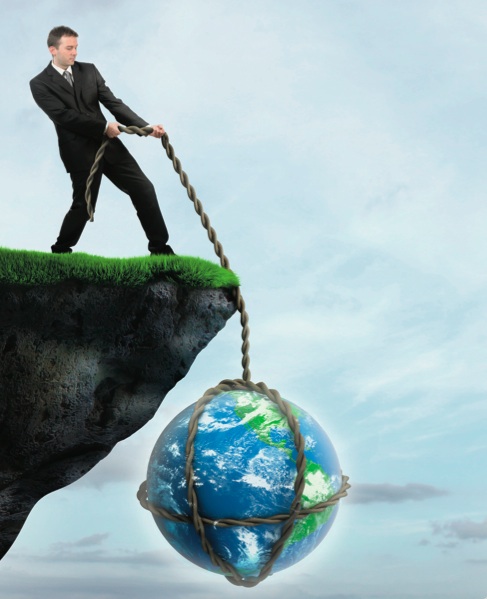The last issue provided a synopsis of the Image Reports panel discussion: ‘Can you sell your sustainability USP as a printer?’ This month, we look at some of the key arguments aired at EcoPrint over why you need to take sustainability seriously even if you can’t.
Not just converted but evangelical is how I’d describe the keynote speakers at EcoPrint, and listening to them explain why the issue of sustainability is of intrinsic importance to our future it’s difficult not to be swayed by their fervour.
Now most people don’t like being preached to, especially when the message is why they should act for the greater good – and more especially when saving oneself has become an everyday struggle. Which is no doubt why, when it’s come to sustainability in business, the focus has switched from moral to economic arguments over the last few years. But if you fail to be frightened by the financial losses risked if your business doesn’t become more sustainable, what Professors Michael Braungart and Hans Joachim Schellnhuber had to say about the bigger issues will surely scare you.
In a strident presentation on the importance of the ‘cradle-to-cradle’ approach to product development, use and disposal, Braungart made it clear that from a global perspective, sustainability is not just about efficiency but effectiveness.
In a lighthearted manner that belied the seriousness of his message, Braungart asked those assembled for EcoPrint’s opening keynote speech: “How is your marriage – sustainable? Sustainability is about more than minimising and reducing what we do; it’s about acting to improve the quality of what we have now and in the future.
“Traditionally, environmental protection has meant destroying less. But reduction will only have a minimal impact – it’s not really protecting our environment, it’s just destroying it a little less. What we need to do, not just in individual businesses but on global levels, is to put in place systems that are actually beneficial.” At which point he pointed out the possibility of things like tree planting around business sites so that they positively impact the local environment (ie. provide oxygen, improve soil, help clean water etc).
“We humans are not too many for this planet, but we’re too stupid to look after it,” added Braungart. “We must learn to do the right things, not just how to do things right. We must remember that not everything that is good is efficient. We must start looking at things that are good for society, not just less bad.”
Of course the cradle-to-cradle approach falls in line with this argument. “Products must be conceived so that at the end of their life they flow back into the biosphere to actively help nature,” enthused Braungart. “It is imperative for the good of the planet that everything is keep in a continual cycle, and that recycled products become the nutrients for new ones. We can now make buildings that actively clean the air within them and support life. We need to start thinking bigger rather than smaller. Reduction is only part of the issue when it comes to sustainability.”
What we really need is a “great transformation towards sustainability” according to Schellnhuber who delivered the keynote on the second day of the event. “You have to ask yourself, does this planet operate in a safe space? In terms of biodiversity – no; in terms of phosphates – no; in terms of climate change – no. In fact, has the Earth’s sixth mass extinction already arrived?” It was an opening gambit that got his audience’s immediate attention!
“Despite what might be said to the contrary, there is a huge consensus among scientists that there is global warming. The polar ice caps are melting much faster than predicted – 50% since the 1980s. We are set for a 5oC rise in temperature by the end of the century. If we have warming of more than 1.5oC ocean acidity will rise and kill off the coral reefs – that is set to happen within a decade. If we keep as it is now we’ll have an 8oC average rise by 2300 and populations will start to die.
“Humankind is at a crossroads. If we start to actively remove CO2 to ensure we don’t have a rise in temperature above 2oC we should be OK. But to do that we need a total industrial revolution and a complete change to the way we live. A great transformation is needed.”
And Schellnhuber was happy to explain what that transformation would require:
- The integration of renewable energy sources,
- ‘Plus energy’ houses that actually generate power
- Electro mobility (electric cars etc.)
- Cradle-to-cradle behavior
- Energy generative urban planning (buildings acting as connection towers for power etc.)
- Carbon farming (the planting of trees/crops to remove carbon from the environment)’
- Regenerative water supply (solar desalination etc.)
“This might sound like a technological fairytale, but as a physicist I say it’s all possible,” stressed Schellnhuber. “Maybe eco-printing will come to be understood as printing cheap solar cells for the outside of your own houses! It all boils down to innovation and ideas. We need scientists to re-engage with the creative/business worlds to stimulate and accelerate innovation.”


